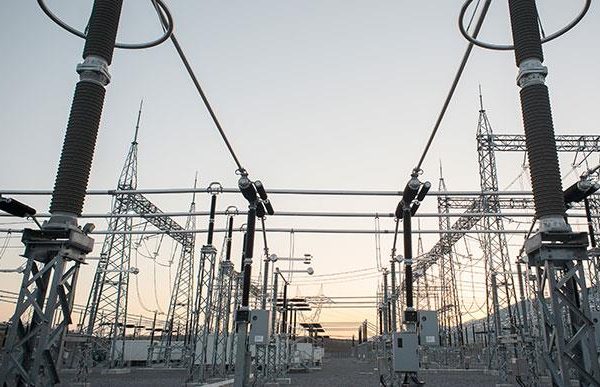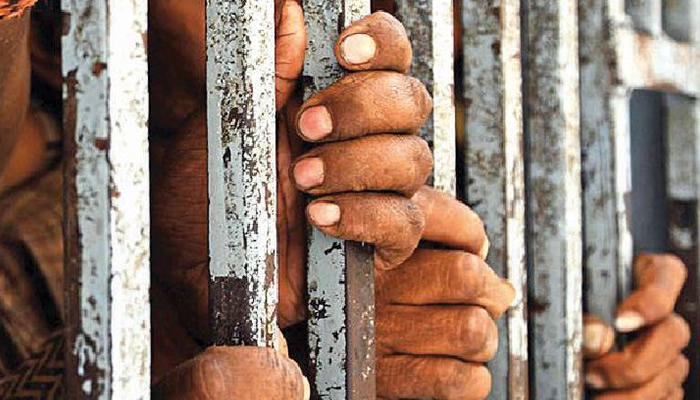Tsunami threats force evacuation after Indonesia volcano
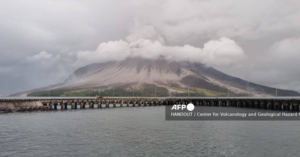
Indonesian rescuers raced to evacuate thousands of people Thursday after a volcano erupted five times, forcing authorities to close a nearby airport and issue a warning about falling debris that could cause a tsunami.
The crater of Mount Ruang flamed with lava against a backdrop of lightning bolts overnight after erupting four times on Wednesday, forcing authorities to raise its alert level to the highest of a four-tiered system.
The volcano in Indonesia’s outermost region was still billowing a column of smoke on Thursday morning, prompting authorities to shut the nearest international airport in Manado City on Sulawesi Island for 24 hours.
Authorities said they were rushing to evacuate 11,000 residents from the nearby area that included the remote island of Tagulandang, home to around 20,000 people.
Some residents were already trying to flee in a panic, according to officials.
“Last night people evacuated on their own but without direction due to the volcano’s eruption and materials in the form of small rocks that fell, so the people scattered to find evacuation routes,” Jandry Paendong, an official from the local search and rescue agency, said in a statement Thursday.
He said 20 staff were helping evacuate residents along the coastline near the volcano on rubber boats.
He called for more boats and equipment so his team could “carry out evacuation for people in the coast or near the coast” facing the volcano.
Tourists and residents were warned to remain outside a six-kilometre exclusion zone.
More than 800 people were initially taken to safety from Ruang to nearby Tagulandang island after the first eruption on Tuesday evening before four more eruptions on Wednesday.
Authorities also warned of a possible tsunami as a result of the eruptions.
“The communities in Tagulandang island, particularly those residing near the beach, (need) to be on alert for the potential ejection of incandescent rocks, hot clouds discharges and tsunami caused by the collapse of the volcano’s body into the sea,” Hendra Gunawan, head of Indonesia’s volcanology agency, said in a statement Wednesday.
The authorities’ fears were compounded by previous experience.
In 2018, the crater of Mount Anak Krakatoa between Java and Sumatra islands partly collapsed when a major eruption sent huge chunks of the volcano sliding into the ocean, triggering a tsunami that killed more than 400 people and injured thousands.
Indonesia, a vast archipelago nation, experiences frequent seismic and volcanic activity due to its position on the Pacific “Ring of Fire”, an arc where tectonic plates collide that stretches from Japan through Southeast Asia and across the Pacific basin.
The impact of Mount Ruang’s eruption led to the closure of Sam Ratulangi International Airport in Manado City, located more than 100 kilometres (62 miles) from the volcano, for 24 hours until Thursday evening.
The airport runways were shut “due to the spread of volcanic ash which could endanger flight safety,” Ambar Suryoko, head of the Manado region airport authority office, said in a statement.
The airport hosts airlines that fly to Singapore and cities in South Korea and China.
“All flights… impacted because the airport is affected by the eruption of Mount Ruang, volcanic ash,” Dimas, a 29-year-old airport officer in Manado told AFP by phone.
Trump, Polish president meet in New York over Ukraine war
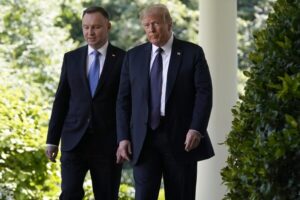
Donald Trump and Polish President, Andrzej Duda discussed the wars in Ukraine and the Middle East over dinner Wednesday in New York, the former US president’s reelection campaign said.
Real estate magnate Trump, on a one-day break from court appearances in his hush money criminal trial, hosted Duda at his Trump Tower property in Manhattan.
“He’s done a fantastic job and he’s my friend, and we had four great years together” when the two were president at the same time, Trump said, standing alongside Duda in a video clip posted on Trump’s Truth Social account.
“We may have to do it again.”
The Trump campaign said the two men discussed Duda’s proposal for NATO countries to increase their target for defence spending from two per cent of GDP to three per cent.
Trump has often criticized NATO and said its members do not pay what he calls their fair share.
“They also discussed the war between Russia and Ukraine, the conflict with Israel in the Middle East, and many other topics having to do with getting to world peace,” the Trump campaign said in a statement.
When not tied up in legal proceedings, the Republican White House candidate has been conducting a kind of shadow diplomacy, as other countries prepare for the possibility of a second Trump presidency.
He has been taking meetings with global leaders and lashing out against the foreign policy of his November opponent, President Joe Biden.
Trump discussed NATO policy and the Ukraine war with British Foreign Secretary David Cameron last week, and entertained Hungarian Prime Minister Viktor Orban at his Florida residence Mar-a-Lago last month.
Duda and Trump were close allies during the 77-year-old’s previous Oval Office tenure, with Poland prioritizing its relationship with the United States — sometimes to the detriment of its ties with the European Union.
Conservative Duda even proposed building a “Fort Trump” US military base on Polish soil.
Amid Trump’s false assertions questioning his own 2020 election loss, Duda took more than a month to congratulate Biden on his presidential win.
Dubai floods: Chaos, queues and submerged cars after UAE hit by record rains
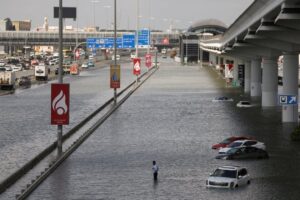
Dubai is wrestling with the aftermath of extraordinary torrential rains that flooded the desert city, with residents describing harrowing stories of spending the night in their cars, and air passengers enduring chaotic scenes at airports.
Up to 259.5mm (10.2in) of rain fell on the usually arid country of the United Arab Emirates on Tuesday, the most since records began 75 years ago. The state-run WAM news agency called the rains on Tuesday “a historic weather event” that surpassed “anything documented since the start of data collection in 1949”.
As the sun returned on Wednesday, along with it came stories of residents stuck in cars and offices through an arduous night.
“It was one of the most horrific situations I had ever experienced,” said one Dubai resident in his 30s, who did not want to give his name, after his 15-minute commute turned into a 12-hour ordeal on flooded roads.
At Dubai’s airport, one of the busiest for international travel, with nearly every flight repeatedly delayed, Emirates passengers were told to stay away “unless absolutely necessary”.
Frustration from those already there began to build.
A large crowd formed at a connections desk, clapping and whistling in protest as they waited for information.
“They are completely lost, it’s complete chaos – no information, nothing,” fumed one passenger, who did not want to be named, after a 12-hour wait, Agence France-Presse reported.
Standing water lapped on taxiways as aircraft landed. One couple called the situation “absolute carnage”. They spoke to the Associated Press on condition of anonymity in order to speak freely in a country with strict laws that criminalise critical speech.
“You cannot get a taxi. There’s people sleeping in the Metro station. There’s people sleeping in the airport.”
The BBC reported other passengers were diverted to Dubai World Central Airport – also known as Al Maktoum airport – telling the broadcaster they had been “living on duty free” and that water was in short supply.
One furious British traveller told PA Media that once his flight was diverted to Dubai World Central, he had not been given any food or water either. “It’s just been an absolute disaster. We’re stuck here and seven hours without a single update is inexcusable.”
Emirates, Dubai’s flagship airline, posted on X on Wednesday night: “Customers should expect delays with departures and arrivals” and that while some passengers had been able to get to their destinations “we are aware that many are still waiting to get on flights”.
The airline cancelled all check-ins and announced that it would continue to suspend services until Thursday morning, apologising for the disruptions. Those on FlyDubai, Emirates’ low-cost sister airline, also faced delays.
Dubai airport posted on X early on Thursday that flights had resumed from Terminal 1 but urged people to travel to the airport only if they had a confirmed booking, as flights continued to be “delayed and disrupted”.
Paul Griffiths, the airport’s CEO, acknowledged the issues with flooding on Wednesday. “It remains an incredibly challenging time. In living memory, I don’t think anyone has ever seen conditions like it,” Griffiths told the state-owned talk radio station Dubai Eye.
Schools will stay closed in Dubai until next week, authorities said, underscoring the difficulty of the clean-up.
In an unusual direct intervention, UAE president sheikh Mohamed bin Nayan ordered “authorities to quickly work on studying the condition of infrastructure throughout the UAE and to limit the damage caused”, official media said.
The president also gave orders for affected families to be transferred to safe locations, said a statement carried by the WAM news agency.
Dubai’s ruler, sheikh Mohammed bin Rashid Al Maktoum, wrote on X about “efforts being made by teams of citizens and residents that continue day and night” as the city’s media office posted video overlayed with dramatic music of officials conferring in groups and water pumping appearing to take place in the background.
Photos too were posted of what it said showed water flooding into desert areas.
Similar scenes were visible around the Gulf state including in Sharjah, neighbouring Dubai, where residents waded through main streets and paddled around on makeshift boats.
At least one person was killed in the flooding. A 70-year-old man who was swept away in his car in Ras Al-Khaimah, one of the country’s seven emirates, according to police.
The UAE government announced that remote working for most federal government employees had been extended into another day because of the impact.
Jury selection in Trump hush money trial faces pivotal stretch as former president returns to
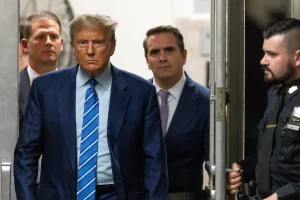
Jury selection in the hush money trial of Donald Trump enters a pivotal and potentially final stretch Thursday as lawyers look to round out the panel of New Yorkers that will decide the first-ever criminal case against a former president.
Seven jurors have been picked so far, including an oncology nurse, a software engineer, an information technology professional, a sales professional, an English teacher and two lawyers. Eleven more people must still be sworn in, with the judge saying he anticipated opening statements in the landmark case to be given as early as next week.
The seating of the Manhattan jury — whenever it comes — will be a seminal moment in the case, setting the stage for a trial that will place the former president’s legal jeopardy at the heart of the campaign against Democrat Joe Biden and feature potentially unflattering testimony about Trump’s private life in the years before he became president.
The process of picking a jury is a critical phase of any criminal trial but especially so when the defendant is a former president and the presumptive Republican nominee. Prospective jurors have been grilled on their social media posts, personal lives and political views as the lawyers and judge search for biases that would prevent them from being impartial. Inside the court, there’s broad acknowledgment of the futility in trying to find jurors without knowledge of Trump, with a prosecutor this week saying that lawyers were not looking for people who had been “living under a rock for the past eight years.”
To that end, at least some of the jurors selected acknowledged having their own opinions about Trump.
“I find him fascinating and mysterious,” one juror selected for the case, an IT professional, said under questioning. “He walks into a room and he sets people off, one way or the other. I find that really interesting. ‘Really? This one guy could do all of this? Wow.’ That’s what I think.”
The process has moved swifter than expected, prompting Trump when leaving the courthouse on Tuesday to complain to reporters that the judge, Juan Merchan, was “rushing” the trial.
The case centers on a $130,000 payment that Trump’s lawyer and personal fixer, Michael Cohen, made shortly before the 2016 election to porn actor Stormy Daniels to prevent her claims of a sexual encounter with Trump from becoming public in the race’s final days.
Prosecutors say Trump obscured the true nature of the payments in internal records when his company reimbursed Cohen, who pleaded guilty to federal charges in 2018 and is expected to be a star witness for the prosecution.
Trump has denied having a sexual encounter with Daniels, and his lawyers argue the payments to Cohen were legitimate legal expenses.
Trump faces 34 felony counts of falsifying business records. He could face up to four years in prison if convicted, though it’s not clear that the judge would opt to put him behind bars. Trump would almost certainly appeal any conviction.
The hush money case is one of four criminal prosecutions Trump is confronting as he vies to reclaim the White House, but it’s possible that it will be the sole case to reach trial before November’s presidential election. Appeals and other legal wrangling have caused delays in cases charging Trump with plotting to overturn the 2020 election results and with illegally hoarding classified documents.
China and Indonesia call for cease-fire in Gaza
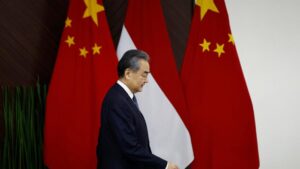
The Chinese and Indonesian foreign ministers called for an immediate and lasting cease-fire in Gaza after a meeting in Jakarta on Thursday, condemning the humanitarian costs of the ongoing war that has killed tens of thousands of Palestinians.
Indonesia’s Minister of Foreign Affairs Retno Marsudi told reporters that the two countries share the same view about the importance of a cease-fire and of resolving the Palestinian problem through a two-state solution.
“I am sure that China would use its influence to prevent escalation,” Marsudi said, adding that China and Indonesia “would also fully support Palestine’s membership in the U.N.”
The meeting took place on the second day of a six-day tour during which Chinese Foreign Minister Wang Yi will also visit Papua New Guinea and Cambodia.
Wang blamed the United States for holding up ceasefire resolutions at the U.N.
“The conflict in Gaza has lasted for half a year and caused a rare humanitarian tragedy in the 21st century. The United Nations Security Council responded to the call of the international community and continued to review the resolution draft on the ceasefire in Gaza, but it was repeatedly vetoed by the United States,” Wang told reporters.
The U.S. vetoed a number of proposed Security Council resolutions because they didn’t tie cease-fire directly to the release of Israel hostages or condemn Hamas’ attacks that prompted the war, before allowing a resolution to a pass with an abstention in late March.
American officials have argued that the cease-fire and hostage releases are linked, while Russia, China and many other council members favored unconditional calls for a cease-fire.
“This time, the U.S. did not dare to stand in opposition to international morality and chose to abstain. However, the US claimed that this resolution was not binding,” Wang said. “In the eyes of the United States, international law seems to be a tool that can be used whenever it finds useful and discarded if it does not want to use it.”
The two ministers also discussed their countries’ economic relationship and the South China Sea.
China is Indonesia’s largest trading partner, with the trade volume reaching more than $127 billion. China is also one of Indonesia’s largest foreign investors, with investment flows of more than $7.4 billion in 2023.
Later Thursday, Wang is also scheduled to meet Indonesian President Joko Widodo and president-elect Prabowo Subianto, who is currently defense minister.
Israel will defend itself amid calls for restraint— Netanyahu
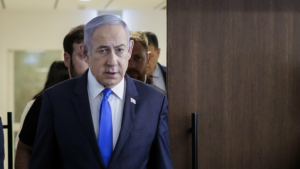
Israel will make its own decisions about how to defend itself, Prime Minister Benjamin Netanyahu said on Wednesday as international communities called for restraint in responding to the attacks from Iran.
“I want to make it clear – we will make our own decisions, and the State of Israel will do everything necessary to defend itself,” Netanyahu said on Wednesday after talking with German Foreign Minister Annalena Baerbock and UK Foreign Secretary David Cameron, who visited Israel with the aim of preventing confrontation between Israel and Iran from escalating.
Israel’s war cabinet is scheduled to convene on Thursday to discuss a wide range of options that Israel could take against Iran, a government source told Xinhua News Agency, adding that a majority of the ministers support a counterattack but have yet to decide on the “scale and timing.”
More than six months into the Gaza conflict between Israel and Hamas that has seen flare-ups across the Middle East, international communities are searching for ways to avert a direct battle between Israel and Iran, facilitating truce talks and urging more humanitarian aid to devastated Gaza.
The United States, European Union and G7 group of industrialized nations all announced plans to consider tighter sanctions on Iran.
The UN Security Council is scheduled to vote on Friday on a Palestinian request for full UN membership.
Qatar, which has served as mediator during the latest Israel-Hamas truce talk, said negotiations were at a delicate phase. Israel says it will discuss a pause to free hostages but will not stop fighting until Hamas is wiped out, while Hamas says it will not release hostages without a truce leading to an end to the fierce fighting.
Qatari Prime Minister and Foreign Minister Sheikh Mohammed bin Abdulrahman Al Thani said at a news conference on Wednesday that Qatar is reassessing its role as a mediator between Israel and Hamas.
The mediation has been exploited by some politicians concerned only with narrow political interests, causing harm to Qatar, said the Qatari prime minister.
“This means that the state of Qatar has called for a comprehensive evaluation of this role. We are now at this stage to evaluate mediation and also evaluate how the parties engage in this mediation.”
The Qatari prime minister also called on the international community to take responsibility for halting the conflict in Gaza and highlighted the importance of refraining from using humanitarian aid as a tool for political leverage.
With the prospect of famine looming, the United States and Israel say access for aid has improved this month. But aid agencies say supplies of food and medicine are still too paltry to stave off disaster.
“Across Gaza, a man-made famine is tightening its grip,” Philippe Lazzarini, head of the United Nations Palestinian refugee agency UNRWA, told the 15-member UN Security Council on Wednesday.
“In the north, infants and young children have begun to die of malnutrition and dehydration. Across the border, food and clean water wait.”
Ruling conservatives win Croatia election – but there’s a catch
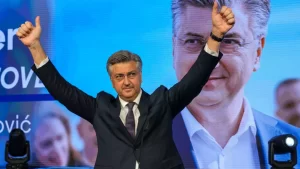
The Croatian Democratic Union won parliamentary elections on Wednesday, however they will need support from the far right to stay in power.
Croatia’s governing conservatives won a sharply competitive election on Wednesday, according to the official vote count.
The ruling right-wing Croatian Democratic Union (HDZ) defeated a centrist left-wing alliance informally led by populist President Zoran Milanovic and his Social Democratic Party (SDP).
However, despite their convincing win, Prime Minister Andrej Plenkovic’s HDZ will need the support of far-right groups to stay in power.
The election followed a campaign centred on a bitter rivalry between the country’s president and prime minister.
With more than 90% of the ballots counted, the state electoral commission said the HDZ won 60 seats in the 151-seat parliament. The SDP got 42 seats.
The far-right Statehood Movement was third, with 14 seats, making it a kingmaker in future talks for the next government.
“Starting tomorrow morning, we will start forming a new parliamentary majority in order to form our third government,” Plenkovic said in his victory speech. “I want to congratulate the other parties that were defeated by the HDZ.”
Turnout was more than 50% – a record – hours before the polls closed.
The election was held as Croatia, a European Union and NATO member, struggles with the highest inflation rate in the eurozone, a labour shortage, illegal migration and reports of widespread corruption.
At stake in the race was also the EU’s unity as it grapples with the instability from Russia’s full-scale invasion of Ukraine.
President Zoran Milanovic of the left-wing SDP – which lost the vote – opposes more aid for Ukraine, which had sparked fears Croatia could align itself with more Moscow-friendly EU members such as Hungary and Slovakia.
However, the HDZ win means the country is likely to continue on its pro-Western course.
The HDZ has largely held office since Croatia gained independence from the former Yugoslavia in 1991.
The Balkan nation became the newest member of the European Union in 2013, and joined Europe’s passport-free travel area and the eurozone last year.
Woman took uncle’s cadaver to bank to take out loan in Brazil

Brazilian police have arrested a woman who tried to take out a bank loan for an elderly man she was pushing in a wheelchair – who turned out to be dead.
Employees at the Rio de Janeiro bank called emergency services on Tuesday after becoming suspicious when the woman wheeled the man in and requested a loan in his name.
When emergency workers arrived, they determined the man was dead, police said in a statement.
Police for the precinct of Bangu, on Rio’s west side, booked the woman for attempted theft by fraud and defiling a cadaver, they said.
Investigations are ongoing to determine how and when the man died.
Brazilian media reports said the woman claimed to be the 68-year-old man’s niece and sought to take out a loan of 17,000 reais in his name.
“She tried to make it look like he was signing the papers,” local investigation chief Fabio Luiz told news site G1.
“But he was already dead when he entered the bank.”
The woman’s lawyer denied the accusations.
Google Fires 28 Employees Involved in Protest of Israeli Cloud Contract

Google on Wednesday fired 28 workers after dozens of employees participated in sit-ins at the company’s New York and Sunnyvale, Calif., offices to protest the company’s cloud computing contract with the Israeli government.
A day earlier, nine employees were arrested on charges of trespassing at the two offices.
“Physically impeding other employees’ work and preventing them from accessing our facilities is a clear violation of our policies, and completely unacceptable behavior,” a Google spokeswoman said in a statement.
Years before the dismissals, tensions had been simmering between the company’s management and some activist employees over Project Nimbus, a $1.2 billion Google and Amazon deal to supply the Israeli government with cloud services, such as artificial intelligence.
That discord had deepened since the war in Gaza began in October. Google recently fired an employee who disrupted an Israeli technology conference in New York. And the company is even planning to make changes to a corporate forum because employees were bickering about the conflict.
Google said it would continue to investigate the Tuesday protests. In Sunnyvale, employees refused to leave the office of Thomas Kurian, the chief executive of Google Cloud.
Google employees affiliated with the group that organized the sit-ins, called No Tech For Apartheid, said in a statement that the firings were “a flagrant act of retaliation.”
“Google workers have the right to peacefully protest about terms and conditions of our labor,” the employees said. They added that some of the employees Google fired had not participated in the sit-ins.
The Nimbus contract, announced in 2021, was to supply various Israeli government ministries with cloud software. Since the contract’s inception, some Google employees have expressed concern that the company was aiding Israel’s military.
A Google spokeswoman said that Nimbus “is not directed at highly sensitive, classified, or military workloads relevant to weapons or intelligence services.”
In 2018, Google workers successfully pushed the company to end a deal with the U.S. Defense Department. Called Project Maven, it would have helped the military analyze drone videos.
Employees who have taken part in Nimbus activism said in their statement that they would continue protesting “until the company drops Project Nimbus.”
Social Media Platform X Pledges To Work With Pakistan Amid Service Disruption

The Pakistani government shut down the social media platform X in the country two months ago, citing threats to national security.
Social media platform X, formerly Twitter, has pledged to work with Pakistan’s government “to understand its concerns” after authorities said an ongoing two-month shutdown of the site in the country was based on national security threats. “We continue to work with the Pakistani Government to understand their concerns,” X’s Global Government Affairs team said in a post late on April 17. It was the company’s first public comments on the move since the site was disrupted on February 17, when jailed former prime minister Imran Khan’s party called for nationwide protests against general elections they say were rigged.
India kicks off the world’s largest elections this week. Here’s what you need to know
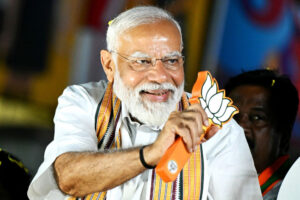
Indians head to the polls on Friday in what will be the world’s largest democratic election, as close to one billion voters pick their next government and decide whether to hand Prime Minister Narendra Modi a third term in office.
The 2024 general elections will pan out in seven phases over the next six weeks, starting April 19.
Voters will decide who fills the seats of the Lok Sabha, the lower house of India’s parliament, for the next five years. The Lok Sabha is the more powerful of the two houses of Parliament.
Whichever party or coalition wins the majority will lead the government and pick the next prime minister. Analysts widely expect Modi’s Hindu-nationalist Bharatiya Janata Party to score another landslide victory in the upcoming elections.
Here’s why India’s elections matter.
India’s meteoric rise
Under Modi’s rule, India’s economy has scaled to new heights. It is now the world’s fifth-largest economy with a GDP of $3.7 trillion and has set its sights on becoming the world’s third-largest economy by 2027.
Home to 1.4 billion people, the world’s most populous country is the fastest-growing economy in the world. Its economy grew 7.2% in fiscal 2022-2023, the second-highest among the G20 countries.
The International Monetary Fund projects that India’s economy will grow 6.8% in 2024 and 6.5% in 2025, compared with China’s predicted growth of 4.6% in 2024 and 4.1% in 2025.
That’s not all.
India’s stock market overtook Hong Kong’s in December to become the fourth largest in the world, and is now valued at over $4 trillion.
Analysts expect Modi to win a third consecutive five-year term, further driving India’s growth trajectory.
“The growth story is not done. But private and foreign investments have been very subdued and exports have also declined,” Suyash Rai, deputy director and fellow at Carnegie India, told CNBC. “So I feel that there is some weakness building up.”
India has forged deeper ties with the West in the past year, and Modi’s reelection could further strengthen U.S.-India relations, said Chietigj Bajpaee, senior research fellow for South Asia at Chatham House.
He said India is seen as a “bulwark against China” as the Biden administration continues to encourage U.S. companies to move electronics and technology manufacturing operations out of China into friendlier countries, like India.
“If there are two countries where there’s the highest degree of consensus, it’s China as a long-term strategic rival and India as a long-term strategic partner. That won’t change,” Bajpaee said.
Key contenders
There will be 543 contested seats in the lower house, and the party or coalition that wins at least 272 votes will form the government.
The two main contenders are the BJP-led coalition known as the National Democratic Alliance (NDA), and the opposition bloc known as the Indian National Developmental Inclusive Alliance (INDIA).
The opposition coalition was formed last year when more than 40 opposition parties joined forces. It is led by the Indian National Congress, whose leading figure is Rahul Gandhi — the son of Rajiv Gandhi, a grandson of Indira Gandhi, and a great-grandson of Jawaharlal Nehru, who all served as prime ministers of India.
The Congress party, which ruled the country for most of its post-Independence era, suffered stinging defeats in the elections in 2014 and 2019.
In 2019, the BJP secured a total of 303 seats. Together with the BJP-led National Democratic Alliance, 352 seats were clinched. The opposition Indian National Congress won 52 seats that year.
This time, the BJP’s coalition bloc is widely expected to once again trump the opposition parties and win a historic third term thanks to the political stability in the last decade, analysts said.
“Policy consistency and political stability are connected to each other deeply. So the expectation will be that the government that comes in will be able to maintain that,” said Amitendu Palit, senior research fellow at the Institute of South Asian Studies, National University of Singapore.
“This will be a significant year for India, and I have a feeling that whoever be the government in India, the foreign policy direction and the economic policy direction are going to remain broadly unchanged,” he told CNBC.
Modi reportedly said in March that he was confident the BJP and NDA would secure a total of 400 seats.
Chatham’s Bajpaee said it’s a “foregone conclusion” that Modi’s BJP will take the reins again this year, but “what’s unclear is the scale of the victory.”
“You don’t need the BJP to lose for the opposition to win. All they need to do is prove the Modi brand has weakened if they don’t perform as well as last time,” he highlighted.
Voters’ concerns
According to a survey conducted by the Centre for the Study of Developing Societies, unemployment was the top concern for 27% of the 10,000 surveyed.
More than half (62%) of those surveyed also said it had become more difficult to find a job in the last five years during Modi’s second term.
“You still have a large proportion of the population which is impoverished, so there are large disparities across the country,” Bajpaee said.
Rising costs is the second-biggest concern, with 23% of voters surveyed saying it was their primary concern. About 35% of respondents said their quality of life had declined in the last five years.
About 13% said their biggest worry was the country’s development, while 8% said corruption was their top concern.
Election in numbers
This will be India’s biggest election yet, with some 968 million people registered to vote — 48% of them women, according to the Council on Foreign Relations. There will also be 18 million first-time voters, Reuters reported.
Given the sheer number of voters, the seven-phase election will last 44 days, from April 19 to June 1, across 554 constituencies, according to the Election Commission of India.
The six-week election is expected to cost more than the 2020 U.S. presidential election where $14.4 billion was spent, according to Washington-based research firm OpenSecrets.
Data from the company showed that India spent $8.6 billion on the 2019 general elections, $2.1 billion more than the 2016 U.S. presidential race.
Results will be released on June 4.
Electoral rules state that since there must be a polling station within two kilometers of every registered voter, there will be about a million polling stations, 5.5 million electronic voting machines, and 15 million staff and security personnel overseeing the election, data from the election commission showed.


